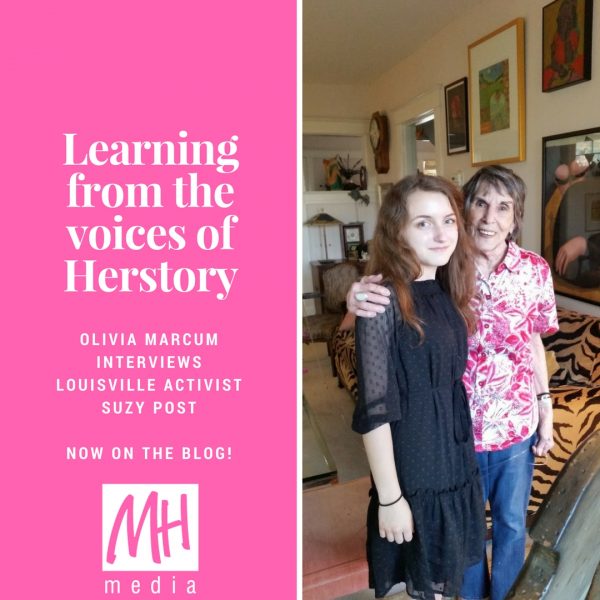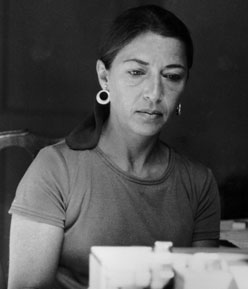
Learning from the Voices of Herstory: Activist Suzy Post
Interview by Olivia Marcum
Although Women’s History Month has now come to a close, I publish this article in the hopes of conveying a message: by taking the goals of WHM and applying them in a long-term, weekly context, we can allow inspiring women in history’s actions in the face of adversity to inform our own approaches to overcoming life’s struggles.
With a career spanning over 6 decades, Suzy Post’s instrumental role in my city’s Civil Rights movement is one which has impacted my childhood. Thanks to her work, I was able to learn in a public school environment that was diverse: she was a plaintiff of the lawsuit which forced Louisville’s public schools to desegregate in the 1970s. Suzy has done much to protect and defend justice, whether this be during her tenure as the president of the Kentucky ACLU; a participant in our city’s open-housing and anti-war demonstrations; a member of the NAACP; the vice president of the national ACLU board; the creator of Kentucky’s first statewide Women’s Conference and the Pro-Choice Project; the organizer of the largest demonstration in my state’s history; or as the founding director of the Metropolitan Housing Coalition in Louisville. With a list of such accomplishments threatening to leave any who dare read it out of breath, it is worth noting that these are but a fraction of the things she has already done―and at 84, will continue to do―in her fight for social justice.
On March 2nd, I sat down with Suzy in the hopes that her experiences and viewpoint as a lifelong advocate might be helpful for budding activists such as myself. From her work alongside Ruth Bader Ginsburg, to her views on recent threats to diversity in our city’s public schools, I share a few of her thoughts and stories:
On the importance of diversity in education:
We rob our children of that [kind of] education if we stick them in a track that only is composed of people who look just like them, and come from families just like theirs. I mean, that’s just so boring! I never understood why people enjoyed that. I guess you feel ‘safe’, but it’s so boring! I learned so much from friends of mine who were very different than my family and different from me, and I didn’t want to be in a class with people just like me―what was that gonna get me? And we had no black people in our classes when I was a girl―none. I think it [a lack of diversity] ties our hands behind our backs because we never develop relationships with people who don’t look exactly like us. Because of that, we become fearful of going into communities, or going into jobs, or going into places where not everybody looks like us―it’s terrible the way we do that to ourselves.

On the recent House Bill 151 introduced to the Kentucky state House of Representatives, that would undermine the diversity that exists in JCPS by reverting back to the neighborhood school model:
Oh it’d be a terrible mistake. Kids survive, so the impact might not be very noticeable until they get a whole lot older and you’re thrown into situations where there are people with very different backgrounds and colors, and you’re uncomfortable around them because, “I’ve never been with people of color,” “I’ve never been with homosexuals,” “I’ve never been with―”; it’s disabling to do that to kids. It denies a very great, rich resource that we’ve got in a community.
On why some people are wanting to resort back to neighborhood schools without diversity:
They want what they’ve always known because that’s what’s easiest, right? Yeah, they don’t want to try something new, and entertain different ideas―that, plus racism is so bad in this country that kids still come from families that are very racist. They come to school very often carrying those bad attitudes around without even having been around people that they [are prejudiced against]. That’s not the way to go. That’s very radical for them [when] they hear a different point of view, but in addition to having a different point of view, they’re not familiar [with those groups of people] . How do you interact with a population you’ve never had any contact with? “Do black people do this… ?,” “Do black people―.” I’ve seen adults who are afraid of being with gays and lesbians and black people and it’s [just sad]. I get bored very easily. I’d get bored fast if I were in a group just like me. What are they gonna teach me?
On the lack of integration at her high school:
That was the way it was set up: it was a neighborhood school. I didn’t have any other choices when I was a girl. We [were] just expected to go to school with all girls, [and] it was awful! It was stupid! It was like a private girls finishing school for, you know, “economically respectable” white girls.
On when her path to activism began, and how being Jewish influenced this:
Probably when I was a girl. When I was still in high school, we were very concerned about the status of civil rights in America it was obvious to me that we had a two layered society: there was us white people, and then there were these black or brown people, and they didn’t have the same resources. And I had a teacher when I was a junior―a sociology teacher―who introduced all kinds of new ideas into the classroom. She encouraged me―because I was concerned about the status of black people―to write a paper on the status of black people in America, and I’m in this lily-white school, with not one black student, and I decided to do that. I went downtown to the Louisville Urban League, which is a black rights organization, and got some material from their library, wrote a paper…. That [civil rights] was really one of the things that I felt really was important. And to a great degree, my feelings towards black people were affected by my being a Jew. If you were to read the papers today you’d read about all these Jewish community centers being attacked around the country right now. Jews make wonderful scapegoats, and we make wonderful scapegoats because there aren’t that many of us, [and] because we do not believe in the Christian theology.

On getting to know Ruth Bader Ginsburg and forming a women’s caucus:
She was very different from me―very much a “lady.” She had married a man who had made a lot of money, so she was very, very privileged. She and I didn’t agree on a lot of things until it came to women, and when it came to women, there was no light between us….I had organized a women’s caucus up there [Washington, D.C.]. When I first went up there, there were only two or three women on a 90 member board. And I started organizing―got all kinds of new and feminist energy on there…She came on the board quite a few years after I was on. By the time she came on, I had organized this group and had been [going] to a women’s caucus that met every Saturday. We broke for lunch at noon. They all came to my room―I had this tiny hotel room―and I’d cram 25 and 30 women in there, and I’d run off and get sandwiches down the street and bring them back. Ruth would sit on the floor with everybody else. She was such a “lady” and it seems funny, but that’s what we’d do. We were very effective. We got a lot of things accomplished by out-thinking the guys, and I mean, they were actually afraid of me; I was the organizer of the women’s caucus, and they knew that that women’s caucus had a feminist agenda.
These excerpts have been lightly edited for clarity and conciseness.
Related Reading
Giving Advocacy a New Face by Katy Brennan
American History: Centering Youth Activism by Lindsey Turnbull
VIDEO: Shoulders of Giants: Jamie Margolin and Rachel Carson
3 thoughts on “Learning from the Voices of Herstory: Activist Suzy Post by Olivia Marcum”